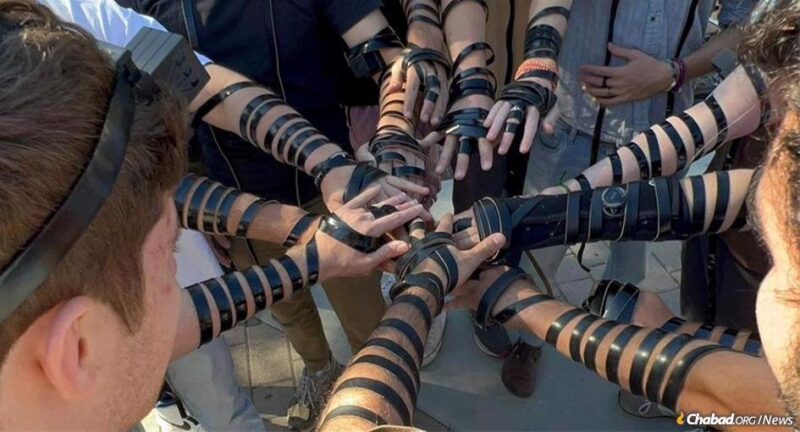
Public Jewish Pride on Campus Counters Hate
by Ellen Braunstein – chabad.org
In the face of antisemitic hostility on university campuses, Jewish college students across North America are challenging one another to gather publicly at the center of their campuses to put on tefillin.
The “Tefillin Together” challenge, started by 15 students at Chabad-Lubavitch of Arizona State University (ASU), has now spread to more than 30 campuses as participants nominate students at new academic institutions to do the next mitzvah.
Messages, photos and videos documenting the “Tefillin Together” gatherings are gaining excitement on Instagram and other social-media sites. One video has attracted more than 40,000 views.
Alexander Milman of Rowan University in southern New Jersey said students at his school first gathered to put on tefillin in the same place that a pro-Hamas rally occurred the day before. They plan to wrap tefillin every day for 40 days, a number that he points out appears many times in the Torah. Nominated by students at Chabad of Ohio University, the Chabad of Rowan students next challenged students at McMaster University in Canada, and Philadelphia’s Drexel University and the University of Pennsylvania to fulfill the mitzvah. Jewish students at those colleges followed suit.
“The goal is that all over the world, we should be showing our Jewish pride, putting on tefillin and saying the Shema in public, displaying that we’re always proud of who we are,” said Tzvi Tiechtel, who helped launch the initiative at ASU, where his parents direct the Chabad center. The initiative, he said, was inspired by the Chabad on Campus Pegisha, a mid-November Shabbat experience for 1,200 Jewish students held in Brooklyn. N.Y.
“We’re showing that in spite of all the antisemitism going on around campuses, Jewish students are standing strong, responding to darkness with light and showing that, as Jews, we will never be afraid of who we are,” said Tiechtel, 20, a rabbinical student who is also working as an educator at Chabad of the University of Kansas.

A Sign of Pride and Protection
Tefillin are black leather boxes that contain the Shema prayer, as well as three other passages from the Torah, and are worn every day by Jewish men over the age of 13. During the runup to the Six-Day War in 1967, the Rebbe—Rabbi Menachem M. Schneerson, of righteous memory—launched the international Tefillin Campaign, calling upon all Jewish soldiers, soon expanding it to all Jewish men, to don tefillin.
At the time, Israel and its millions of inhabitants were being threatened with decimation by their surrounding enemies, and the Rebbe cited the verse in Deuteronomy that “the nations of the land will see that the name of G‑d is called upon you” and run away fearfully, which the Sages explain refers to tefillin. The Rebbe thus stressed the vital importance of Jewish men donning tefillin,, especially during times of grave danger for the Jewish people.
In some cases, Jewish students putting on tefillin were greeted by antisemitic intimidation, Tiechtel said. “In classic Jewish fashion, we’re not responding with fear. It’s really been very beautiful to see how much the students want to do it and how people have been touched, inspired and motivated.”

Jeremy Urbach, who is past president of Chabad of Western University, said about 15 students showed up at the student union to put on tefillin. “Obviously, it’s very tense on campus at the moment because of what is going on all over the world.”
Urbach described an antisemitic response at the student union. “When they saw a bunch of Jewish kids on the floor above the atrium, people started taking photos and videos of us. All we did was wrap tefillin. They called campus security saying we were antagonizing them. They just don’t like Israel or Jews. When the campus security showed up, they saw we were just praying.”
“The ‘Tefillin Together campaign’ is amazing,” said Rabbi Shmuel Tiechtel, co-director of the Chabad at ASU with his wife, Chana. He noted that what started as three students grew to 20 on campus.
“It was a very powerful moment,” he said. “I’m just amazed to see young people have a conviction, the desire, and the dedication to see the goodness that is brought forward from it.”












